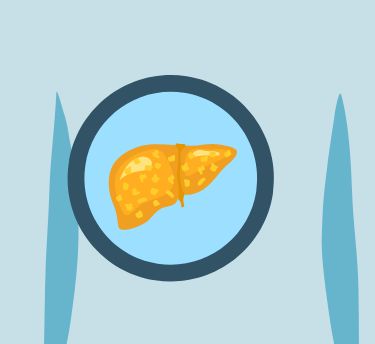The Liver
Your liver is a large organ that sits on the right side under your ribcage. It performs many important functions in your body, such as separating nutrients and waste which pass through the digestive system. It also produces bile, which helps the digestion of food and carries toxins out of your body.
What is Fatty Liver Disease?
Fatty liver disease is a condition that is caused by a build-up of extra fat in the liver. The liver naturally contains some fat, but when the level exceeds 5-10%, it is classed as fatty liver disease.
Most cases of fatty liver disease do not cause any serious problems, but in some people (up to a third), it can lead to liver damage.
Fatty liver disease progresses through the following stages:
- Steatohepatitis: The liver becomes swollen or inflamed and its tissue is damaged.
- Fibrosis: Where the liver has been damaged, scar tissue begins to form.
- Cirrhosis: Large amounts of scarring is present which is replacing healthy tissue.
Thankfully, fatty liver disease can be prevented or reversed with changes to your lifestyle.
Cirrhosis of the Liver
When the liver is severely damaged, it causes scarring – called cirrhosis. As the amount of scarring increases and replaces healthy liver tissue, the function of the liver is impaired. It can cause complete liver failure or liver cancer.
Types of Fatty Liver Disease
The two main types of fatty liver disease are:
- Non-alcohol related fatty liver disease: This is a common condition caused by a build-up of excess fat in the liver. Factors such as being overweight and having diabetes increase your risk of developing the disease.
- Alcohol-related fatty liver disease: This is caused by drinking too much alcohol. Alcohol is a toxin which damages the liver, and, over time, the liver becomes unable to repair the damage it. Scarring develops which can lead to liver failure or liver cancer. The condition is much more common in people with risk factors for liver disease, such as being overweight or having diabetes.
Who is at Risk of Developing Fatty Liver Disease
- People who are obese
- People with a high level of belly fat
- Those with high blood pressure
- Those with diabetes
- Those with high cholesterol
- Post-menopausal women.
Causes of Fatty Liver Disease
- Being overweight
- Having Type 2 diabetes
- High blood pressure, high cholesterol, or insulin resistance)
- Certain prescription medications.
Symptoms of Fatty Liver Disease
In most people, fatty liver disease causes no symptoms. The following symptoms are sometimes seen in more advanced cases of the disease:
- Abdominal pain or fullness
- Nausea
- Loss of appetite and weight loss
- Weakness
- Yellowish skin and whites of the eyes (jaundice)
- Swelling in the abdomen and legs
- Extreme tiredness
- Confusion
Diagnosing Fatty Liver Disease
As there are often no symptoms, fatty liver disease may be detected by a doctor in blood test results. High liver enzyme levels are a sign that the liver may be damaged. To confirm the diagnosis, the following tests may be requested:
- Liver imaging: Such as ultrasound or CT scan.
- Liver Biopsy: To see how advanced the liver disease is.
- Liver Elastography Fibroscan: A diagnostic tool for liver diseases, which uses a specialized ultrasound (often instead of a liver biopsy) to determine the amount of fat, how damaged the liver is, and the amount of scar tissue. The approach is non-invasive and highly accurate, reducing the need for invasive biopsies.
Treatment of Fatty Liver Disease
There are no medications to treat non-alcohol related fatty liver disease at the moment, but there are some in the advanced stages of clinical trials.
- Lifestyle changes: Adapting your diet, losing weight and avoiding alcohol can prevent certain types of fatty liver disease.
- Medication: Taking medication that will control your cholesterol and diabetes.
- Vitamin E and certain diabetes medication: These may help some patients.
- Liver transplant: If the liver has begun to failure, a liver transplant might be the only option.
© Copyright 2017 Cleveland Clinic Abu Dhabi. All rights reserved.
This information is provided by Cleveland Clinic Abu Dhabi, part of Mubadala Healthcare, and is not intended to replace the medical advice of your doctor or health care provider. Please consult your health care provider for advice about a specific medical condition.

